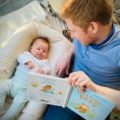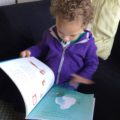It is generally agreed by experts that reading is a complex process.
When we read we are seeking meaning from the words and/or pictures on a page or on a screen. Children who become successful readers are helped to make sense of what they read from the beginning and they need books that interest them.
As children are read to and enjoy picture books and rhymes with their parents they begin to ‘read’ books for themselves, using their memory of the story.
As children continue to have more experience of books and stories they begin to be able to really focus on the words on the page, to recognise some words, and begin to read for themselves. Like many aspects of language and learning development, learning to read varies from child to child.
When children do begin to read for themselves, they are helped by all the experiences of books, stories and talk they have had with parents and carers – not just about books but about everyday events and activities.
These shared experiences of language and life can help children to make sense of stories. They will be able to realise whether a sentence ‘sounds right’ and begin to be able to make a ‘best-guess’ for reading the words. Children use the patterns and rhythms of a book to help them read fluently. This is why rhyming books are very supportive for children at the beginning stages of reading.



 Follow lovemybooksUK15
Follow lovemybooksUK15